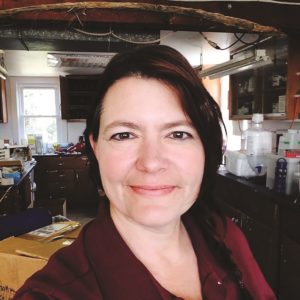PROVINCETOWN — Unlike the stereotypical introverted scientist, Sarah Oktay, the new executive director of the Center for Coastal Studies (CCS), puts herself out there.
“It has always been my M.O. to help the public feel engaged and part of the solution,” said Oktay, speaking by phone from the University of California Davis, where she is the director of strategic engagement for the John Muir Institute of the Environment.

Oktay, who is 58 and holds a Ph.D. in chemical oceanography, will take over the nonprofit on Jan. 1, when President Richard Delaney transitions to the role of senior adviser.
Until 2016, Oktay worked on Nantucket for 12 years, running the University of Massachusetts’s Boston-Nantucket Field Station. “I spent a lot of time talking at the Antheneum, and I did a weekly column for Yesterday’s Island,” she said. “I have 800 pages of essays I have written about humpback whales, great white sharks, and seals — lots on seals. When I left Nantucket, it was front-page news.”
Her work involves the chemicals that harm water quality. For example, she has studied the chemical profile of the ash in the Hudson River that resulted from the 9/11 attack.
“I feel that scientists need to communicate to the public what we do,” she said. “The public pays taxes that enable our research, and people have a hunger for what is going on.”
The CCS was founded almost 50 years ago by Graham Giese, Charles “Stormy” Mayo, and the late Barbara Shuler Mayo. It was among hundreds of nonprofits and field stations that began popping up in the late 1960s, inspired by the influential best sellers of biologist Rachel Carson, Oktay said.
The center had a budget of $3.8 million and Delaney earned $170,000 as president in 2019, according to the latest federal tax returns available.
Oktay said the center has become a big name in marine research. There is no better place to learn about the ocean and whale migration, she said.
The CCS is the world leader in the study of right whales, she said.
Saving right whales from extinction will be her number one priority, she added. There are fewer than 400 left in the world. The slow surface-dwelling creatures are being killed by ship strikes and fishing gear entanglement. A female can have only one calf a year, and throughout her life may produce 30 calves, said Oktay. If each female stayed healthy, the species would rebuild. But right whales are easy to kill; ship captains often don’t even see them.
“For the tankers that bring cars to the U.S., it feels like hitting a chipmunk,” she said.
Oktay said she has known Delaney for over 20 years and has been a “super fan of the Center for Coastal Studies. I cannot think of a place I’d rather help more,” she said. “There is incredible staff retention. When you are looking for a new job, you always want to go to a place where the staff are invested.”
Delaney will remain as a senior adviser and plans to attend the U.N. Climate Change Conference (also known as the Conference of the Parties, or COP) in Glasgow in November, said Cathrine Macort, the CCS director of communications.
During Delaney’s tenure, the center’s staff doubled to 40, and Delaney worked to make the oceans a priority in global climate change policy. In 2015, he attended the U.N. conference where the historic Paris agreement was ratified. He assisted in adding language critical to ocean health.
Oceans produce 60 to 70 percent of the oxygen in the atmosphere, Delaney said. People hear about the rain forests, but phytoplankton, the microscopic organisms that live on the ocean’s surface, are even more critical to the air we breathe.
Delaney began his 40-year career as a science teacher and a field naturalist on Cape Cod, and then became regional director of the Cape Cod Planning and Economic Development Commission (the predecessor of the Cape Cod Commission).
Delaney is convinced that good science leads to solutions.
For example, the center has done water quality monitoring at 150 sites on the Cape for 20 years, he said. These data show where wastewater has harmed bodies of water. The data helped influence the state legislature to attach a 2.7-percent tax on short-term rentals to address the wastewater problem on the Cape.
“That is the full circle,” Delaney said. “Good science, good policy, and money to solve it.”



